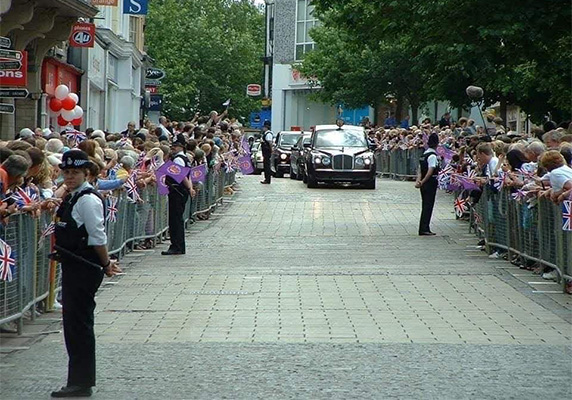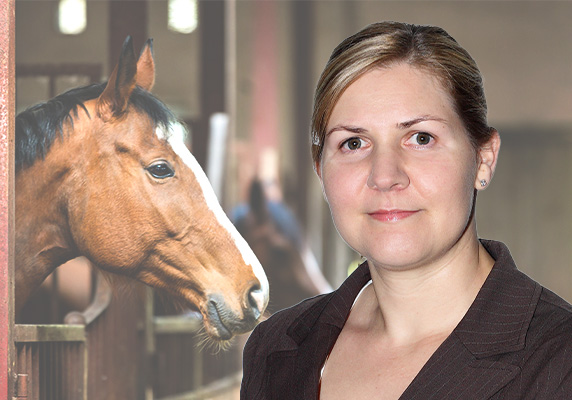Leah Manning always dreamed of working with horses, so she became a lawyer.
“My parents, obviously, wanted me to finish high school,” she says. “I just wanted to drop out and go and play with ponies.”
Manning was to become an equestrian, a police officer, a solicitor at MinterEllison and, in 2020, principal of the Tweed Heads equine-law firm Equilegal. But, like any showjumper, she had to navigate a course laid out with obstacles first.
Manning was two years old when her family migrated from Norwich to Perth as ‘Ten Pound Poms’ in 1972, and 14 when they all returned to England. As a child, she rode horses every weekend, and then left school at age 17 to begin a two-year apprenticeship as a riding instructor.
After passing her British Horse Society exams, she went to work for international showjumper Lionel Dunning. She also bought a horse and competed herself.
It was hard work on the show jumping circuit, as Dunning’s head groom and travelling groom; the job was physically taxing and poorly paid. “I absolutely loved it,” she says, “but when I left, I was on thirty pounds a week plus accommodation – and my horse cost me sixty pounds a week.”
She sustained a number of riding injuries and was hit by a car before she realised she could not carry on anymore.
Picking up the flowers
Manning says she never had any “ambition or intention” to join the police, but a chance encounter with a woman police officer led her to apply for a position with the Norfolk Constabulary.
At 30, she was the second-oldest recruit on the police training course. “They all laughed at me,” she says. “But they didn’t laugh at me so much when they saw me do my physical: I got the record for the most press-ups any female officer in the history of the force had ever done – 59 in one minute.”
There were few women on the Norfolk force, but Manning was lucky enough to work under a female sergeant. She was given compelling cases from the beginning, taking statements from rape victims and investigating drug smuggling into women’s prisons.
She worked on protection duty for Queen Elizabeth II when the Queen visited Norwich.
“They tried to surround her with female officers,” says Manning. “People in the crowd would often give the Queen flowers, which she would take from them, but she would then turn and give them to her lady-in-waiting. The lady-in-waiting would then turn and would give them to a female officer. If someone does jump the rails, you’ve got police near her – but they’re not doing much more than picking up the flowers, really.”

After four years with the police, Manning went back to Australia with the intention of joining the force here, but instead ended up enrolled in law school with the idea of becoming a prosecutor. She studied at Bond University, where she could take the accelerated-learning option and graduate in three years. But she needed to eat so, after her first semester, she worked full-time through the full-time degree. She says she was always rushing between work and tutorials and didn’t have time to sit in cafés and socialise.
Did she enjoy her law studies?
“I just wanted to get it done,” she says. “I didn’t dislike it.”
Manning temped as a conveyancer at MinterEllison and ended up joining the firm. She stayed for five years, and then started her own property-law practice, Icon Legal, in the hope of finding a more even work/life balance. She had given up riding long ago, but she gradually began to take up animal matters – first concerning dogs, then horses.
“Horses are, in effect, property,” she says. “They’re goods; they’re an item. They come under property law.”
As an equine lawyer, she says, “the things that came to me immediately were dodgy horse sales.
“Because the racing industry is massive, there are a huge number of thoroughbred horses that are trained to race. And they all retire at some point. Some are kept to be bred from – but there are those that are no good, too slow, and there’re also those that’re injured. A lot of failed or retired horses would end up in saleyards. Everyone could go and pick up an ‘off-the-tracker’ for next to nothing. There’s often information on the horse’s pen saying how old the horse is and what it’s done: ‘It’s suitable for a beginner and it’s 10 years old’. Often, the horse is nothing like what is said.”
The horse might be much older than stated, or be unfit for the work it is supposed to do. Auctioneers do not release the details of private sellers, so it is difficult to chase them for misrepresentation. And if a horse costs, say, $500, a buyer is unlikely to spend thousands of dollars seeking redress through the legal system.
Bombproof horses and dodgy sales
Manning says she deals with cases where “people believe they have bought something that is not what they were sold” at least once a month. In 2020, she had a matter of “a notorious dodgy horse-dealer”, who had sold about 200 horses from her website “and every horse was advertised as ‘bombproof’”, says Manning, meaning it was suitable for beginners.
“You say ‘bombproof’ when literally a bomb can go off next to a horse and it won’t flinch,” says Manning. “Not a lot of bombproof horses exist.”
In reality, they were mostly recently retired racehorses, used to being ridden hard and fast, and they posed a danger to any novice rider.
Manning had about 20 clients who had been thrown off horses bought from the same dealer. One suffered a spinal injury; others fractured limbs. A rider had to be airlifted to hospital with a broken pelvis. All the horses were sold with a money-back guarantee, which the dealer refused to honour. Manning and her clients featured on Network 10’s The Project, levelling their accusations against the dealer.
“We’re not stopping until she’s brought before the court and she’s repaid the clients,” Manning told The Project.
But the dealer kept dodging her court dates.
“I won the cases,” says Manning. “I got to enforcement; she fled the country. She’s in New Zealand.”

Manning also undertakes pro bono work on horse-welfare issues. Again, she says, there are problems in the saleyards.
“They’re used as dumping grounds for bad horses,” she says. “Sometimes a seller has dumped in the saleyards a horse that clearly needs veterinary attention and shouldn’t be standing in a pen. I’ve seen horses there that’re standing on three legs, horses that’re starving. The auctioneers should not be accepting horses that’re in those conditions. The ‘doggers’ buy them up really cheap and take them off to slaughter them for dog meat.”
Oddly, this can drive up the price of cheaper horses.
“People try and outbid the doggers to save the horse,” says Manning. “You have to bid on a horse for more than its meat’s worth.”
Manning joined a team that saved 20 horses from starvation after drought and bushfires in Mudgee in 2020. The animals were stranded on a property, eating bark and leaves to survive. “It was basically a negotiation with the owner to agree to surrender them to us,” she says. “They were skin and bones and, in the two weeks it took to get the horses out, something like another five dropped dead.”
A horse traceability scheme
The story featured on the ABC’s Landline, where Manning added her voice to the call for a national horse register. She told the broadcaster, “This is the Government’s job, this isn’t the job of individuals that don’t know these horses, that don’t know this owner.”
She said, “The national horse traceability scheme would help with that. We could identify the horses, identify the owners, be able to do something about the horses. Whether it’s we seize them, whether there’s prosecutions, whether it’s working with the owners … something can be done.”
In December last year, it was finally agreed that a National Horse Traceability Implementation Taskforce would be formed to oversee the implementation and operation of a traceability system.
Manning says her equestrian background is a huge help in her work. “Horse law is an emotional area of law,” she says. “People will generally come to me because something has happened, and they love their animal. And sometimes they want to believe that somebody is responsible. I have had a number of veterinary negligence matters, only one that, in my opinion, had sufficient evidence to prove it, and that ended up in an insurance settlement.”
And clients who believe they have been conned are not always correct. “I know that a rider can make a huge difference,” she says. “An experienced rider can get on a horse and that horse knows it, and it’s not going to put a foot wrong. A beginner can get on it and they’re going to take advantage – they’re going to be naughty – and it’s because you’re a beginner, not because that horse is a bad horse.”
Sometimes, she says, the buyer just needs riding lessons.
Manning’s work in equine law has helped bring her back to keeping horses.
“I own five now,” she says. “I don’t really ride. I pat them and go, ‘Aren’t you beautiful?’”
